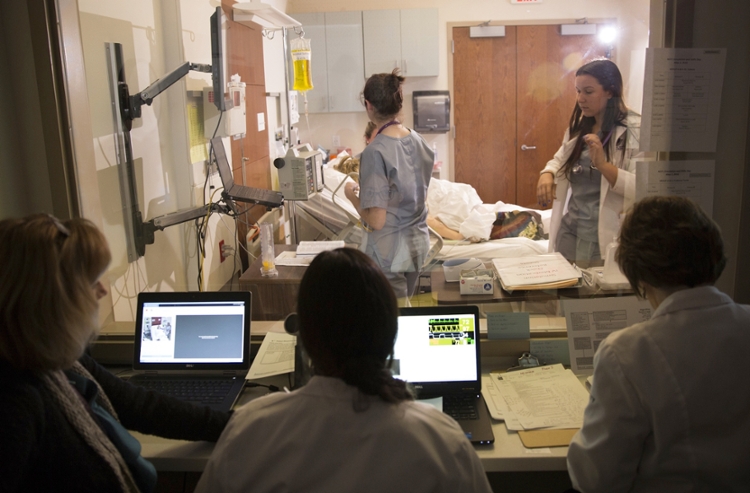University of Scranton Nursing Program Named Center of Excellence by National League of Nursing

University of Scranton professors watch nursing students during an acute care simulation in one of the labs in the school’s newly renovated state-of-the-art facility. The University’s Nursing Program earned the National League of Nursing’s prestigious designation as a Center of Excellence in Nursing Education for 2016-2020 in recognition of its sustained efforts in “Creating Environments That Enhance Student Learning and Professional Development.”
The University of Scranton’s Nursing Program joins just 56 schools and organizations in the nation that have earned the National League of Nursing’s prestigious designation as a Center of Excellence in Nursing Education. The National League of Nursing (NLN) named Scranton a Center of Excellence for 2016-2020 in recognition of its sustained efforts in “Creating Environments That Enhance Student Learning and Professional Development.”
NLN Center of Excellence status for schools is awarded based on demonstrated and sustained excellence in faculty development, nursing education research or student learning and professional development. Schools must also have a proven commitment to continuous quality improvement.
“The NLN is proud to recognize those schools and organizations that are doing the outstanding work that sets them apart from others,” said Anne Bavier, Ph.D., NLN president, in a press release announcing the 15 institutions earning Center of Excellence status in 2016. The institutions will be formally recognized at a NLN Education Summit in September.
The application process for this designation required Scranton to demonstrate how it met NLN’s six criteria for excellence in student learning and professional development. Criteria included: a comprehensive and ongoing plan that develops students’ values and socializes them to new roles, professional involvement and commitment to lifelong learning; demonstration that pedagogical research is used to develop innovative program designs that prepare graduates to engage in high-quality, evidence-based practice; collaboration among faculty, students and clinical partners that ensure innovative, individualized and evidence-based nursing education; and examples of students and faculty active engagement in their communities, that results in enhanced student learning and professional development; among other factors.
In its nearly 100-page application for NLN Center of Excellence status, The University of Scranton noted that for over 30 years the number of graduates from its baccalaureate program who pass boards on their first attempt averages above 90 percent. Furthermore, its family nurse practitioner master’s degree program graduates have achieved a 100 percent board pass rate since the inception of the program. In addition, Scranton’s nursing curriculum incorporates research-based pedagogies that are interdisciplinary and responsive to a changing health care system. Examples include several interprofessional clinical simulation experiences, a variety of low and high fidelity simulation experiences that are course related, and a senior simulation that includes a “Rapid Response and Code” situation. The Clinical Liaison Model has also been recognized as a clinical teaching model that promotes patient safety and student learning in a challenging health care environment.
Scranton noted its nursing students at every program level experience clinical placements and service, providing learning experiences that are individualized, innovative and evidence-based. Among the multiple examples included in the application was the T.A.P.E.S.T.R.Y Program, a four-year professional development program within the Panuska College of Professional Studies for undergraduate students. Also mentioned was the Graduate Panel for Seniors, initiated more than 20 years ago in response to student survey information indicating the need for a direct connection with graduates in order to ask poignant questions regarding NCLEX preparation, interviewing skills and acquiring their first professional nursing position.
Scranton noted numerous ways in which its nursing faculty are active in research, play a leadership role in national professional organizations and are active in community organizations – locally and internationally, as well as numerous community service learning projects of its students.
In addition, Scranton’s Nursing Department provided a number of examples of learning activities designed to enhance interprofessional collaboration at the undergraduate and graduate level. These include an Interprofessional Summit an Interprofessional Simulation, an acute care simulation involving Scranton nursing students, medical students from TCMC and social work graduate students from Marywood University.
Nursing degrees offered by Scranton include a BSN; LPN to BSN; RN to BSN; Adult-Gerontology Clinical Nurse Specialist, M.S.N.; Family Nurse Practitioner, M.S.N. and post-master’s certificate; Nurse Anesthesia, M.S.N. and post-master’s certificate; and a Doctor of Nursing Practice, DNP. The University’s nursing program is accredited by The Commission on Collegiate Nursing Education (CCNE).
The NLN is the premier organization for nurse faculty and leaders in nursing education with 40,000 individual and 1,200 institutional members. NLN members represent nursing education programs across the spectrum of higher education, and health care organizations and agencies.






